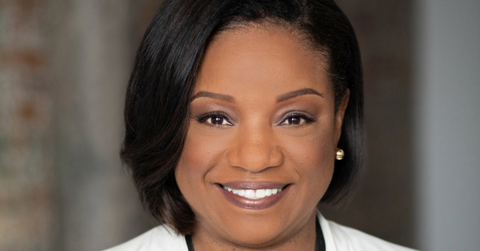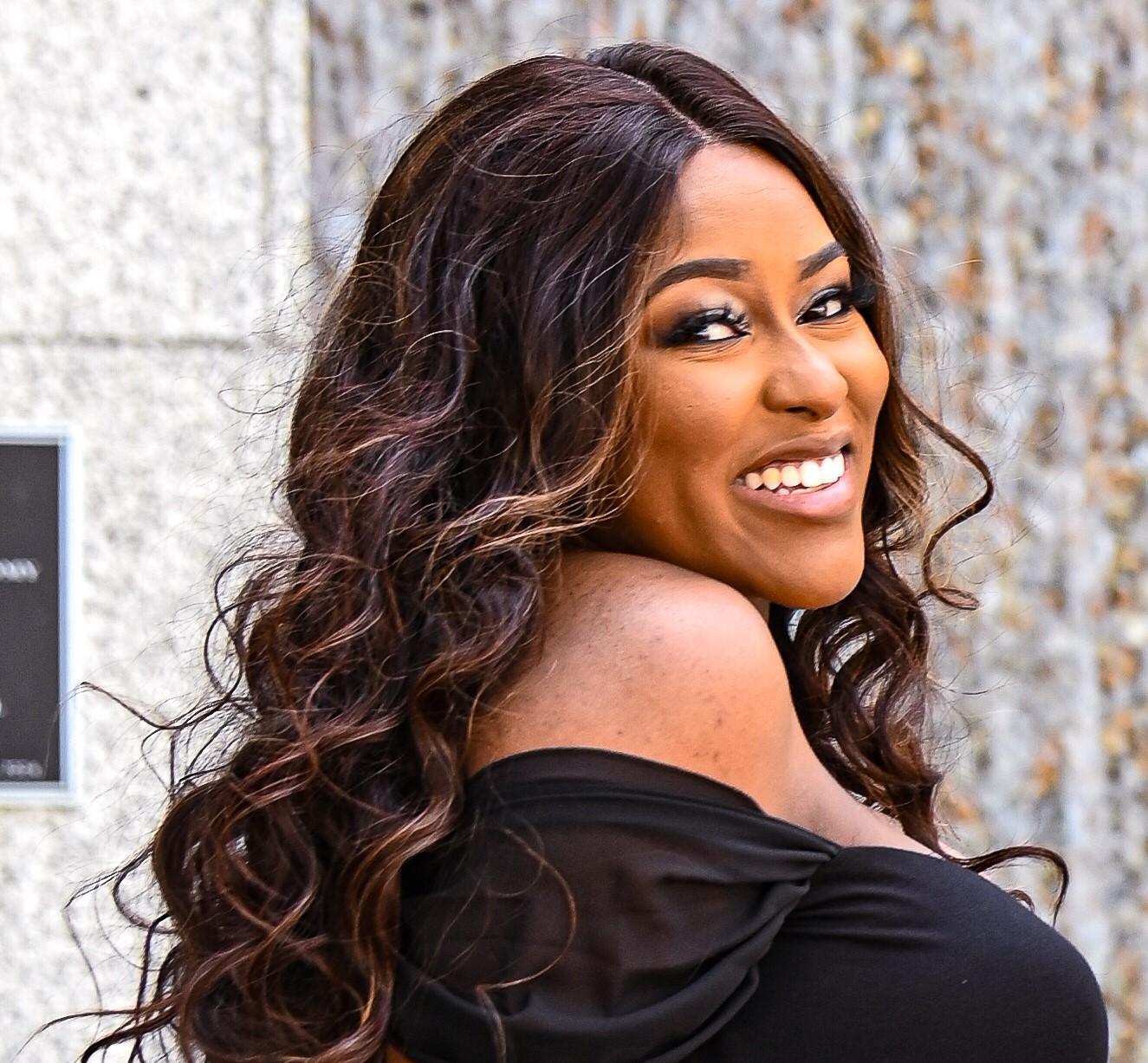Margaret D. Nadauld once said, “A woman of faith is fearless.” That quote stood out as I prepared to speak with Kelley Cornish, President and CEO of the T.D. Jakes Foundation. She’s an executive with over three decades of experience leading diversity and inclusion efforts now taking the reins of the Dallas-based nonprofit founded by servant leader and minister, Bishop T.D. Jakes.
With Kelley at the helm, she is working to curate initiatives through The T.D. Jakes Foundation for young women and girls to be supported in environments from STEM and STEAM to corporate America. I was eager to learn the goal and impact they are hoping to have on future leaders. But there’s something about people who grow up below the Mason-Dixon line that brings a charm like no other. I may be biased but in conversing with Kelley Cornish, it felt like an afternoon chat with an aunt or church member.
In our conversation, I learned what led Kelley from her southern roots in South Carolina to the role she has today, how faith is intertwined in her work, as well as advice to aspiring professionals.
Her Agenda: One of the first things I noticed when doing my research is that you went to school in Aiken, South Carolina. My family is from Greenville. I have other family members that have lived in Aiken. What’s even more admirable is that I read a quote where you said, my life’s work started as a little girl in Aiken and I will always bring it up because I’m so proud. Talk to me about why you are so proud to be from Aiken.
Kelley Cornish: First of all, a lot of people don’t know about Aiken, so to actually know about Aiken, that’s just like a thing, right? But it’s my family’s roots. They were in Edgefield County, Aiken County on my mom’s side, and Augusta, Georgia on my dad’s side. Even though I was born in Augusta, by the age of two, my parents moved to New Jersey, I would fly back every summer and that’s where I would get my grounding. That’s where I had to go to church and to revival, to the missionary circle, to usher board meetings. You [just] did all the South Carolina, Georgia stuff. I didn’t know what Disney was. That was our vacation. But I loved to be with my grandparents and just in our family because where we lived, I didn’t have family. All my cousins were there. I feel like I became the person that I am because the women [around me] were very involved and it was built all around community, family, and church. That’s just who we were, that’s what we did. I didn’t know any better. They were planting the seeds for what I would ultimately do in my life. When I point back to success, I’m like, it started there. That’s where I learned about life about family about Black community and how we solve problems in the church. My heart will always be there. I’ve lived in a lot of places, but it’s something about Aiken, South Carolina.
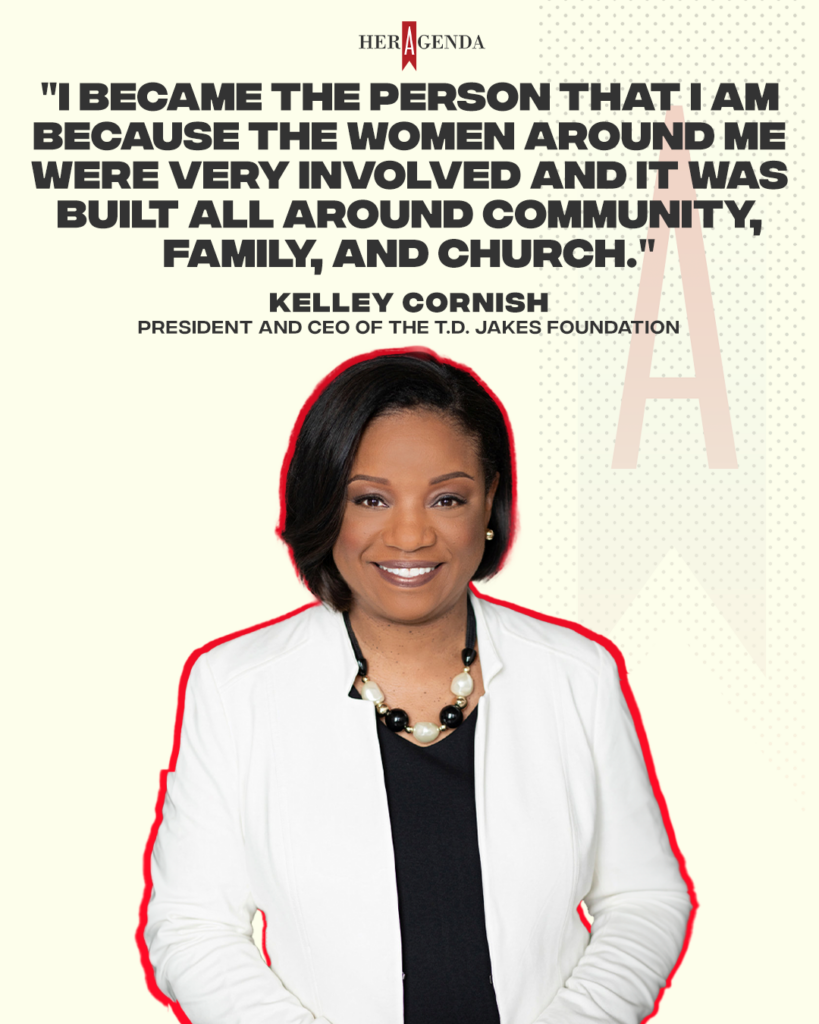
Her Agenda: You went to University of South Carolina- Aiken where you literally almost built your own master’s because you did this human resource management major, but you specialized in diversity and that’s what your dissertation was about. You were at the forefront of what diversity is today. In thinking about where you started versus where it is today, what do you notice has shifted in the conversation about diversity, and what do you think has remained the same?
Kelley Cornish: First of all, what has evolved is the terminology, but the nature of the work has not changed. The terminology was like minority affairs then we got into affirmative action and then EEO, equal employment opportunity, then diversity, then diversity and inclusion, then diversity, equity, and inclusion. Now you have social justice and I heard something called JEDI, justice, equity, diversity, and inclusion, so it’s all evolved, but it’s rooted in the civil rights of the 1960s —that’s where it was birthed.
Of course, one of my heroes is Dr. [Martin Luther] King, [who was at] the forefront of all of that. And so what has evolved is the terminology, but it all goes back to [and] is anchored in the Civil Rights Act of 1964. And I always look back to that. What does it say? We’ve had amendments and different laws evolve from that. But what has stayed the same is that people are still talking about the underserved, the under-represented, and those who are not part of the mainstream. That language still is very much alive and well. There’s still a voice. People still need a voice bigger than theirs to fight the fight on their behalf, so that’s what has continued.
Her Agenda: I love that. Especially because I think for people like me. I’m from Birmingham, Alabama, so it’s a big, small-town kind of place. I think exposure always helps us and somebody doing that championing helps further what people have. There’s no shortage of people dreaming big in like small places but there is a little bit of a problem with the connection, [and mapping out] how do you get there.
Kelley Cornish: Absolutely. It’s [about] education, exposure, and experience. You have to be educated. You have to be exposed. And then you have to get the experience. That’s where you can lean into the haves and the have-nots. The people who have had the opportunity to reach for that dream, know they can reach for it. They’ve seen it. They’ve seen someone, and more so someone that looks like them do it, right? If you can see it, you can be it. That’s still very much alive and well. I try my best even with my kids, I try to expose them to things I wasn’t even exposed to because I know the things I was exposed to, that’s what I anchored onto. That’s what I latched onto. Most underserved, marginalized communities haven’t had the opportunity to see it, to be in it, to experience it. That’s some of the work that we’re doing, just trying to open up those doors.
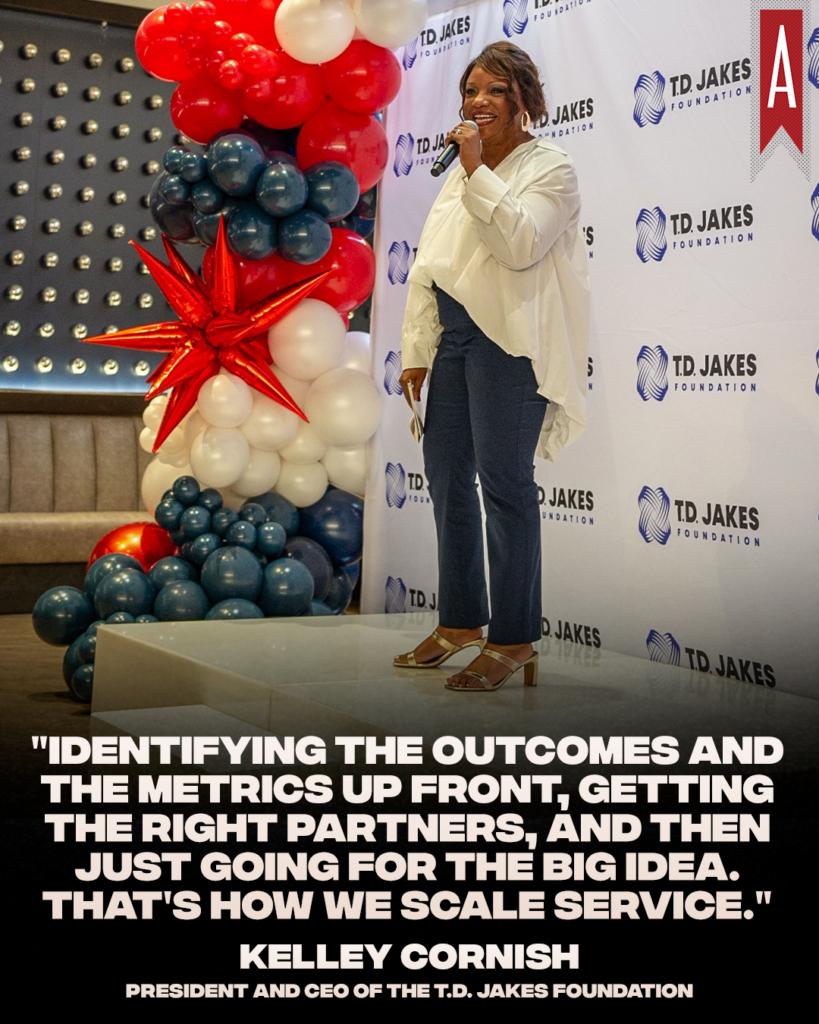
Her Agenda: Before I get to what you do today, one thing that stood out to me was your financial background. Of course, Wells Fargo is a giant. What do you think has been your biggest takeaway from leaving roles like that to come into your current role at T.D. Jakes Foundation? What do you feel like is that one thing that [you learned that you] bring to this role?
Kelley Cornish: It’s a few things, but one in particular is, I would say that it was the largest organization I’d ever worked for. In having that exposure to the very top of the organization and learning some of the dynamics that was a part of the top of an organization, i.e. being in meetings, at least once or twice a month with the CEO because then you can understand what they’re thinking, what’s on their minds, the agenda around your body of work. That was huge. Also how to scale — how to take an idea and then make sure it scales either across the country or in other parts of the world. Having that experience in designing programs that will help those who are underrepresented. Those three things I bring to the TD Jakes Foundation, more specifically, when I think about having the interaction with our chairman, I’ve been exposed to having interactions with people in high positions who are visionary thinkers, big thinkers — and not feeling like, oh my gosh, like I can’t do this. No, Kelly, you’ve done this before. It looks different, but you’ve done it before. Being in a large corporate organization, it teaches you how to think across and from an enterprise view, as opposed to just downstream with just a line of business.
Her Agenda: You segue right into like a really good point. When looking at the mission of the T.D. Jakes Foundation, I saw that the mission is strategy centered around service. This is very unique because as a consultant, I feel like it is hard to scale service. After all, there’s only so much time and there’s only so much process before you have to hand it off to somebody else. How do you all go about scaling service knowing that you’re in the business more so of people and helping and not just business and revenue?
Kelley Cornish: That’s good. That falls in our programmatic areas. Partnerships are huge for us, that allow us to serve and to scale. When you partner with others, with big organizations like the Dallas Mavericks, Wells Fargo, Truist Bank, the city of Dallas it allows you to scale your products, your services, and your programs along with them.
We depend on collaboration. They look at us from a brand perspective because we can scale with the brand name and then they can scale with their resources. So it’s all in the partnerships, the collaborations, and then when we start a partnership, what does success look like? Who are the stakeholders at the end of this? It’s number one, identifying the outcomes and the metrics up front, getting the right partners, and then just going for the big idea. That’s how we scale service.
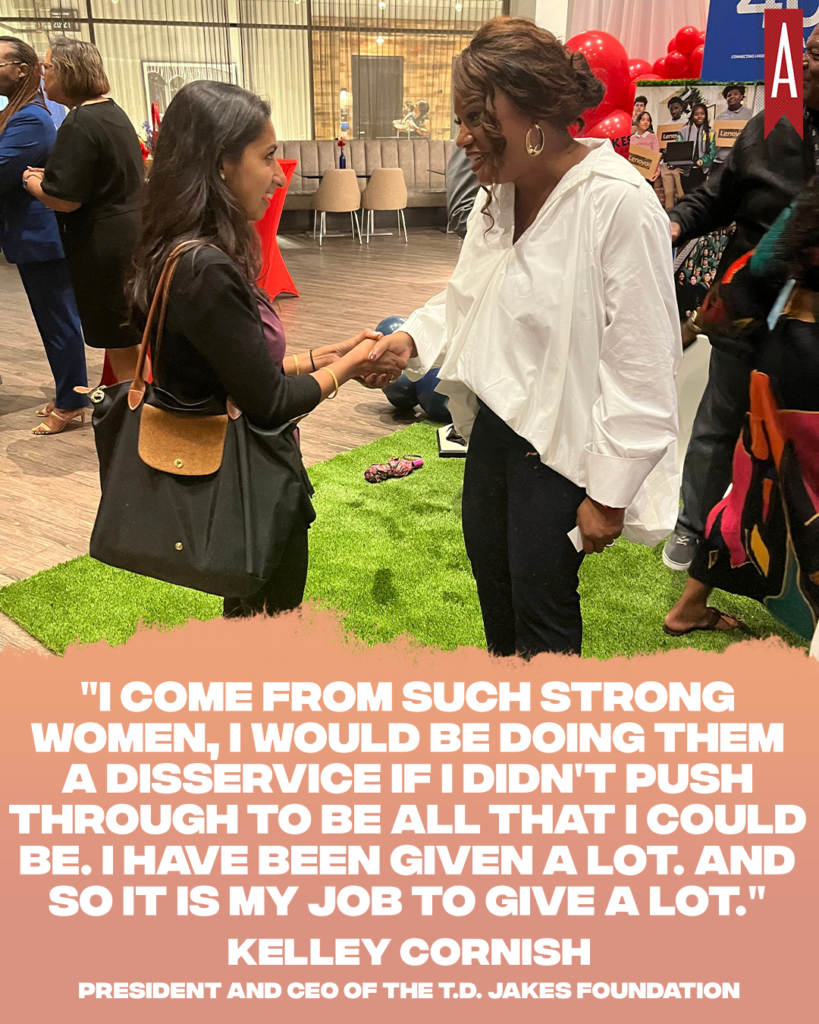
Her Agenda: Let’s take a step back— how did you get to this role and what are your plans for it?
Kelley Cornish: I do believe that everything that we just talked about really led me to this role.
With the TD Jakes Foundation, when I had some initial conversations with our chairman, he [asked me] what are those things that you’re passionate about? And luckily the things that I was passionate about aligned with the work that we’re doing. [I’m passionate about] providing opportunities beyond what people have access to [including] STEAM and STEM. Again, one of those opportunities where [young people] can experience it through education and exposure.
Also through our hiring mixers that we do, where we are providing an opportunity and we partner with all the greats. We [partner with] organizations that have those high-tech roles because it’s those high-tech roles that will pay more money, that will literally pull a community from one tax bracket to another. They’re not going from making $10 an hour to $12 an hour. We’re seeing them make competitive wages.
And that’s what I’m all about, that’s what the TD Jakes Foundation is all about. That’s when we will begin to see generational wealth go up in our communities, because number one, they’re exposed, they’re going to school for higher paying jobs and they’re getting jobs in the technology fields, in the STEAM and STEM fields that will allow them to change the trajectory of their families.
Her Agenda: You talked about collaboration, but as an executive, you have been at the top for quite some time. You wrote a book with Myron Rolle and he was your mentee. You talked about this whole concept of taking the assignment. How do you feel like taking the assignment plays into being an executive as well as this role where you kind of have to collaborate with other people that have other ideas outside of your mission?
Kelley Cornish: It’s so many times you’re gonna get a phone call from someone to ask you to do something that was not carved out. It was not part of your plan. You’re like, what in the world does that have to do with what I’m doing? However, you know, like any other job description there is a line of other duties as assigned, so they can put anything in that. I’ve learned that it’s in those opportunities that I was sort of resistant where all of the deeper growth in who I was and my competencies increased. You know, that example with Myron was absolutely right.
The CEO of the company at the time knew I had created a program and administrative fellowship when I was in another organization. He had that in the back of his mind. He was like, well, you did it there, you can do it here. I was like, but is that what I’m supposed to be doing? But it turned into an amazing, amazing experience. I learned more through the partnership, working with Myron than he probably did. That whole reverse mentoring happened, it was an amazing experience.
I would say when you’re in an organization like T.D. Jake’s Foundation, for us, we have people come to us all the time asking us or pitching us an idea. Now since we have a team, I can go back to a small group and say what does this look like? Does this fit into the pillars? Or is this someone that we just stay in touch with once a quarter to see if something will ultimately align? Right now, it’s just been a blessing. We do have a lot of people coming our way, wanting to partner. However, we have to begin to streamline because it has to have a greater impact. It has to have an impact on the communities that we both serve. We do some due diligence around it, but I will tell you, it’s in those individual assignments that I received as a professional that allows me now to understand that, yes, sometimes you have to go off the radar a little bit to bring something in to make the program grow, but more times than not, you have to stay the course just so you can make sure you’ve accomplished your goals.
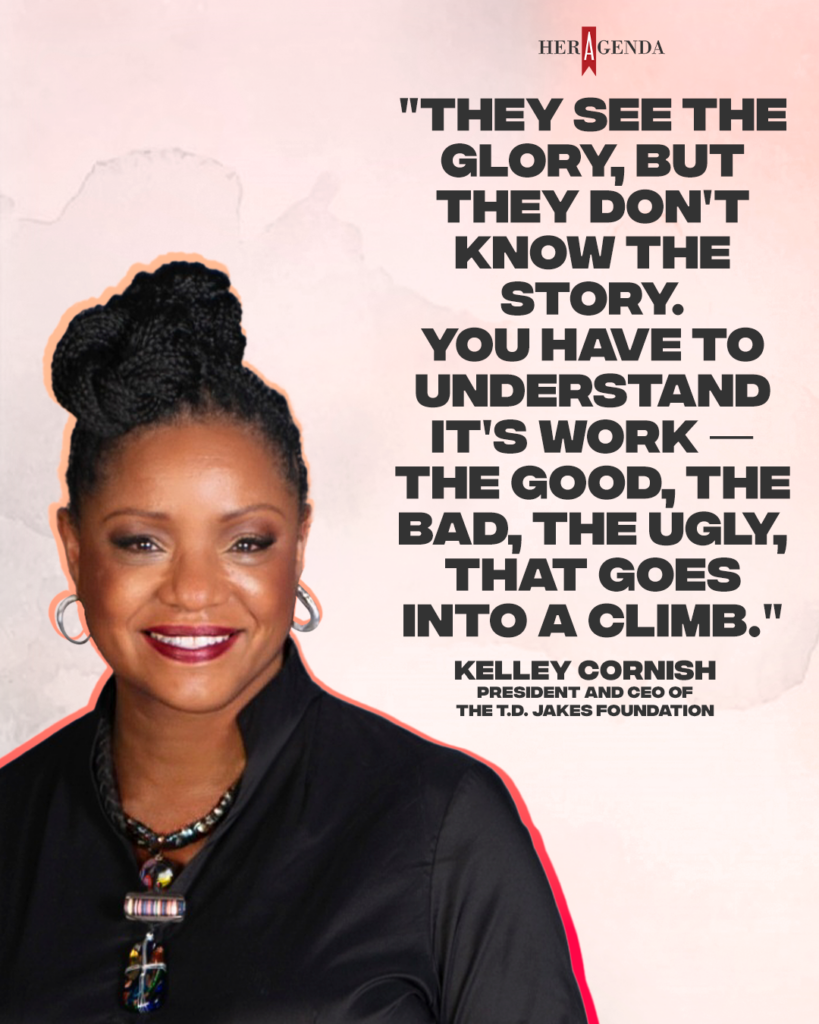
Her Agenda: Looking at your background, there is a constant thread of faith. It has to be a pillar of everything you do. I know we’ve already talked about you kind of having a church background already, but I feel like you have a very unique perspective and that is because you are also a first lady of a church.
Kelley Cornish: I love it. I am, I am. It’s so weird. I was talking to my team the other day. I said, my father was a pastor, my grandfather was a pastor, my husband’s a pastor, and now my boss is a pastor. Like, you can’t escape, right? I can’t run from it. It’s chasing me down. It is such a humbling experience. With my husband being at the helm of our church and coming alongside him and just understanding the intricacies. For me, it’s understanding, that this is the church, it’s not corporate. [In] corporate, we have all these rules and all of this. And, you know, the church is a very different entity. And you’re right, I stand strong with my faith and it has been the cornerstone of what has gotten me even to this role today.
Her Agenda: My last question is what would be like a piece of advice you would share with someone that would be looking to model your career and what you’ve done?
Kelley Cornish: A lot of it is cliche. They see the glory, but they don’t know the story. You have to understand it’s work — the good, the bad, the ugly, that goes into a climb. By God’s grace, my trajectory has constantly been a rise except for once when I was out of the workplace for a couple of years, not by choice of my own, but by a corporate decision. And then I had to regroup and came right back, didn’t miss a beat.
I would just say, women and women of color in high positions, it’s nine times out of 10, they worked long, hard hours and sacrificed a lot — their health, their family, financials to get to the role. So I would say take a deep dive into your soul and your spirit and ask yourself if you’re willing to commit to be at the top because it’s a commitment. When they say it is a lonely place, it is a lonely place, because it’s not just being in the role, but it’s understanding all that it took for you to get there and everything you had to sacrifice. Part of it is losing yourself and then when you get to the top, you have to find yourself because you need all of who you are to land the assignment.
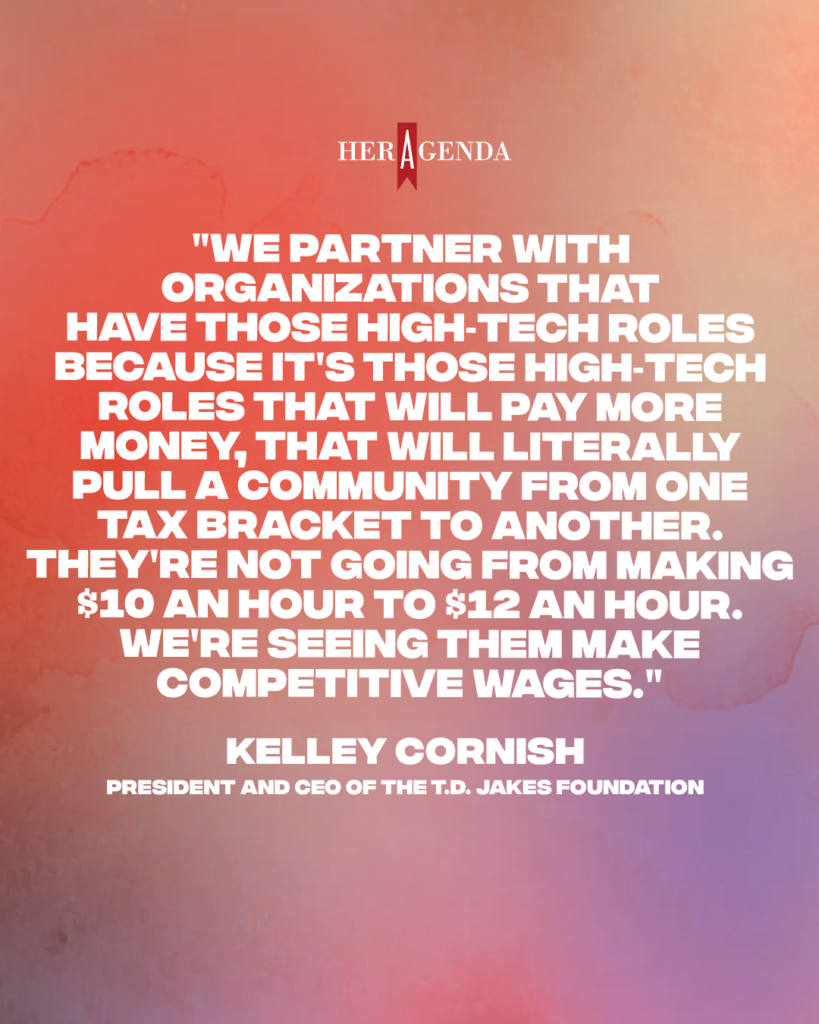
I would also say, it’s nothing wrong with not being at the top. We’re needed everywhere. Sometimes you’re called to be that person that supports the person at the top. Think about what your call is. It’s weird, I always thought of myself as supporting that person at the top, but I would always end up at the top. At the end of the day, if you choose to accept this mission or something like that, it is worth it. People are watching, little girls are watching, older people are watching, and you’re standing on the shoulders of so many different people, but you’re also creating new opportunities for the people that are coming behind you. Just decide you wanna do it, and if so, just go for it.
I come from such strong women, I would be doing them a disservice if I didn’t push through to be all that I could be. I have been given a lot. and so it is my job to give a lot.
That is my motto, to whom much is given, much is required.
[Editor’s note: This interview has been edited for length and clarity.]

